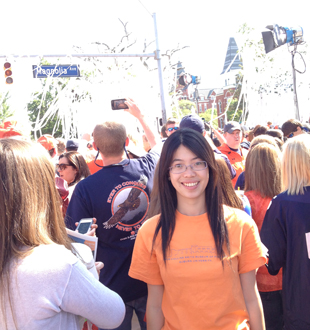| Future Students | Students | Scholars & Faculty | Alumni & Global Community | Donate |
Chinese Student Keeps Homeland Holiday Traditions Alive in Auburn
AUBURN – In the South the sweet treats known as MoonPies are often a first resort when a craving for a confection comes calling.
But Chinese students at Auburn, such as Zhizhi Sheng, are more likely to tell you about the delight one can find by eating a mooncake, a sweet pastry with a filling of paste from red beans or lotus seeds. They are usually eaten on the Chinese holiday of Mid-Autumn Day.
Sheng has lived in Auburn two-and-a-half years but still enjoys celebrating the holidays of her home country whenever possible.
"The Spring Festival, which is most important festival in China, on that day I will watch the Spring Festival gathering through the Internet in order to celebrate with my family. In China, I would go with my parents to visit a lot of relatives and meet a lot of friends. For other festivals like Mid-Autumn Day, we would eat mooncakes," Sheng explained.
Sheng is pursuing a Ph.D. in materials engineering at Auburn and is from the Zhejiang province of China, which lies on the country’s eastern coast.
"Zhejiang province is the neighbor of the city of Shanghai, just below Shanghai," Sheng said. "I’m from the city of Taizhou. If we talk about the population, it’s more crowded than Auburn.
"I’m from Huangyan District. Huangyan is most famous for its oranges, and nowadays there are many plastic products which are produced there. Many families have their own factory to produce these plastic products."
Sheng found her way to Auburn through an exchange program between Auburn and the Taiyuan University of Science and Technology, where she received her bachelor’s degree and completed part of her master’s degree. She finds Auburn to be a great place to live and study.
"Life is good here. I like the weather. I think it’s quiet. It’s a good place to do research. Life is simple here. Every day you just manage your own time. I think it’s simpler than life in China," Sheng said.
She also enjoys the technology available to her as she conducts her research.
"I’m doing research about magnetostrictive materials. It’s material that’s magnetic. When you apply the magnetic field on the material, the rectangular shape of the samples will vibrate along the direction of the magnetic field. It can reach its resonance frequency under the magnetic field. Then you can catch the signal to indicate how this magnetostrictive behavior behaves," Sheng said.
Recently, magnetostriction has been used as a biosensor in detection of bacteria, and Sheng sees her field moving quickly in that direction.
Right now Sheng balances her cutting-edge research with life in the United States.
Sheng said, "I think the most different thing is the transportation. We have more public transportation in China. We don’t have to drive by ourselves. So here, I’m learning how to drive."
Currently, she is hoping to become a college professor after she finishes her studies at Auburn. She might pursue post-doctoral work in the United States or return to China and become a professor at a university there. But for the moment, she is happy to focus on her research and enjoy her time in Auburn.
"I would like to make a lot of friends here," Sheng said. "I hope to have more chances to meet many friends from different countries."
Last Updated: September 7, 2013





